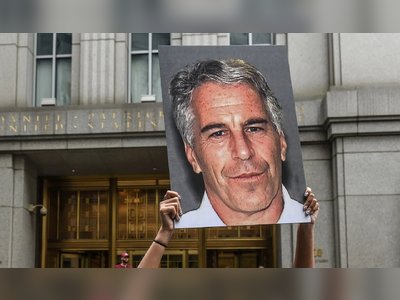
Family food bills up by £800 a year
Record 16% surge in shopping prices, Kantar survey shows
Food prices are rising at record rates, adding almost £800 a year to shopping bills in the latest sign of the tight squeeze on family finances, new figures have revealed.
A survey by data group Kantar shows grocery inflation running at 16.7 per cent, a monthly jump of 2.3 percentage points and a figure in excess of the official CPI rate of inflation of 10.5 per cent.
The figures came as the International Monetary Fund warned that Britain would be the only leading economy likely to fall into recession this year as it battles a triple whammy of higher taxes, interest rates and energy bills.
Fraser McKevitt, head of retail and consumer insight at Kantar, said: “Late last year we saw the rate of grocery price inflation dip slightly but that small sign of relief for consumers has been short-lived. Grocery price inflation jumped a staggering 2.3 percentage points this month to 16.7 per cent, flying past the previous high we recorded in October 2022. Households will now face an extra £788 on their annual shopping bills if they don’t change their behaviour to cut costs.”
Sue Davies, head of food policy at Which?, called on supermarkets to do more to help struggling consumers. She said: “These figures are deeply concerning. Some households are already skipping meals to make ends meet and our research shows trust in supermarkets taking a hit as many people worry they are putting profits before the people suffering in this cost-of-living crisis.”
The IMF said Britain’s economy would contract by 0.6 per cent this year — a near full percentage point downgrade on its last forecast in October — and a stark contrast with other G7 economies such as the United States, Japan and France which are all set to grow.
Even Russia, which has been hit by Western sanctions following Vladimir Putin’s invasion of Ukraine, is set to increase GDP by 0.3 per cent after a contraction of 2.2 per cent last year. The IMF’s assessment will come as a blow to Rishi Sunak and his Chancellor Jeremy Hunt who have pledged to boost economic growth this year.
As well as high energy prices, taxes and interest rates, the British economy is being hit by a wave of strikes. Tomorrow train drivers, bus staff, teachers and other public sector workers will walk out in a “mega strike” — the biggest single day of industrial action since the disputes started. In a further setback for millions of households already impacted by the cost-of-living crisis, the Bank of England is expected to again raise interest rates this week as it fights to fend off inflation. That rise, probably of 0.5 percentage points to four per cent, will be the tenth increase in succession.
Amid the latest gloomy forecasts, government minister Richard Holden, insisted that the IMF had been “wrong” before. He told Times Radio: “They’ve been wrong in the last two years, the OECD were also wrong over the last two years. I think Britain can beat those predictions.” He added on GB News: “I’m not saying there aren’t headwinds, internationally, there certainly are, but I think Britain can outperform just like we have done and beat these forecasts just like we have done over the last couple of years.”
But shadow chancellor Rachel Reeves tweeted: “This points to difficult times for our economy. Britain has so much potential. But we’re being held back and lagging behind.”
Although the IMF said the UK is likely to bounce back with growth of 0.9 per cent in 2024, it painted a dark picture for the rest of this year contrasting it with the better than expected performance of other advanced economies.
The IMF said: “Growth in the United Kingdom is projected to be –0.6 per cent in 2023, a 0.9 percentage point downward revision from October, reflecting tighter fiscal and monetary policies and financial conditions and still-high energy retail prices weighing on household budgets.”
Pierre-Olivier Gourinchas, director of research at the IMF, said the global outlook was “less gloomy” than its October forecasts, adding it “could represent a turning point, with growth bottoming out and inflation declining”. But, he warned that Britain was set to face a “sharp correction”this year.
Three years on from the UK’s departure from the European Union, Paul Johnson, director of the Institute for Fiscal Studies, said the country was being held back by the “continuing challenges from Brexit”. He told the BBC Radio 4’s Today programme: “There are a few things which are affecting us more than other countries. One in particular, actually is the loss of people from our labour force... we’ve lost half a million plus people from work — people retiring early, immigrants not coming in from the European Union and so on.
“That’s not affecting any other country in Europe. So that’s a particular challenge for us. Higher interest rates are feeding very quickly through to mortgages in the UK and we’ve got, of course, the continuing challenges from Brexit.”
Meanwhile, Tesco on Tuesday announced a wide-ranging overhaul of its stores which will impact around 2,100 jobs. The supermarket chain said it will extend changes to store management roles, shut remaining counters and hot delis and shut a number of in-store pharmacies as part of the shake-up.
The Kantar research found shoppers have been switching away from branded products and opting for supermarkets’ own-brand equivalents to save money. Sales of own-label products have risen 47 per cent over the last year, according to the figures. However, consumer spending on promotions, such as two-for-ones, is at a record low, accounting for just 23 per cent of spending in the four week period studied by the market research firm.
While the grocery sector is “incredibly competitive”, Kantar’s Mr McKevitt told the BBC that food “is not something we can choose whether we buy or not”. He added that people have been cutting back on streaming services — “that’s something people can choose to cut back on, but if you need to feed yourself, feed your family, you’re going to have to go to the shops”,
The research found that Aldi was the fastest-growing grocer for the fourth month in a row, with sales up 26.9 per cent year-on-year and now holding 9.2 per cent of the market. Lidl’s sales jumped by 24.1 per cent to give it a 7.1 per cent market share. Tesco remains the largest retailer with a 27.5 per cent share while Asda holds 14.2 per cent.
A survey by data group Kantar shows grocery inflation running at 16.7 per cent, a monthly jump of 2.3 percentage points and a figure in excess of the official CPI rate of inflation of 10.5 per cent.
The figures came as the International Monetary Fund warned that Britain would be the only leading economy likely to fall into recession this year as it battles a triple whammy of higher taxes, interest rates and energy bills.
Fraser McKevitt, head of retail and consumer insight at Kantar, said: “Late last year we saw the rate of grocery price inflation dip slightly but that small sign of relief for consumers has been short-lived. Grocery price inflation jumped a staggering 2.3 percentage points this month to 16.7 per cent, flying past the previous high we recorded in October 2022. Households will now face an extra £788 on their annual shopping bills if they don’t change their behaviour to cut costs.”
Sue Davies, head of food policy at Which?, called on supermarkets to do more to help struggling consumers. She said: “These figures are deeply concerning. Some households are already skipping meals to make ends meet and our research shows trust in supermarkets taking a hit as many people worry they are putting profits before the people suffering in this cost-of-living crisis.”
The IMF said Britain’s economy would contract by 0.6 per cent this year — a near full percentage point downgrade on its last forecast in October — and a stark contrast with other G7 economies such as the United States, Japan and France which are all set to grow.
Even Russia, which has been hit by Western sanctions following Vladimir Putin’s invasion of Ukraine, is set to increase GDP by 0.3 per cent after a contraction of 2.2 per cent last year. The IMF’s assessment will come as a blow to Rishi Sunak and his Chancellor Jeremy Hunt who have pledged to boost economic growth this year.
As well as high energy prices, taxes and interest rates, the British economy is being hit by a wave of strikes. Tomorrow train drivers, bus staff, teachers and other public sector workers will walk out in a “mega strike” — the biggest single day of industrial action since the disputes started. In a further setback for millions of households already impacted by the cost-of-living crisis, the Bank of England is expected to again raise interest rates this week as it fights to fend off inflation. That rise, probably of 0.5 percentage points to four per cent, will be the tenth increase in succession.
Amid the latest gloomy forecasts, government minister Richard Holden, insisted that the IMF had been “wrong” before. He told Times Radio: “They’ve been wrong in the last two years, the OECD were also wrong over the last two years. I think Britain can beat those predictions.” He added on GB News: “I’m not saying there aren’t headwinds, internationally, there certainly are, but I think Britain can outperform just like we have done and beat these forecasts just like we have done over the last couple of years.”
But shadow chancellor Rachel Reeves tweeted: “This points to difficult times for our economy. Britain has so much potential. But we’re being held back and lagging behind.”
Although the IMF said the UK is likely to bounce back with growth of 0.9 per cent in 2024, it painted a dark picture for the rest of this year contrasting it with the better than expected performance of other advanced economies.
The IMF said: “Growth in the United Kingdom is projected to be –0.6 per cent in 2023, a 0.9 percentage point downward revision from October, reflecting tighter fiscal and monetary policies and financial conditions and still-high energy retail prices weighing on household budgets.”
Pierre-Olivier Gourinchas, director of research at the IMF, said the global outlook was “less gloomy” than its October forecasts, adding it “could represent a turning point, with growth bottoming out and inflation declining”. But, he warned that Britain was set to face a “sharp correction”this year.
Three years on from the UK’s departure from the European Union, Paul Johnson, director of the Institute for Fiscal Studies, said the country was being held back by the “continuing challenges from Brexit”. He told the BBC Radio 4’s Today programme: “There are a few things which are affecting us more than other countries. One in particular, actually is the loss of people from our labour force... we’ve lost half a million plus people from work — people retiring early, immigrants not coming in from the European Union and so on.
“That’s not affecting any other country in Europe. So that’s a particular challenge for us. Higher interest rates are feeding very quickly through to mortgages in the UK and we’ve got, of course, the continuing challenges from Brexit.”
Meanwhile, Tesco on Tuesday announced a wide-ranging overhaul of its stores which will impact around 2,100 jobs. The supermarket chain said it will extend changes to store management roles, shut remaining counters and hot delis and shut a number of in-store pharmacies as part of the shake-up.
The Kantar research found shoppers have been switching away from branded products and opting for supermarkets’ own-brand equivalents to save money. Sales of own-label products have risen 47 per cent over the last year, according to the figures. However, consumer spending on promotions, such as two-for-ones, is at a record low, accounting for just 23 per cent of spending in the four week period studied by the market research firm.
While the grocery sector is “incredibly competitive”, Kantar’s Mr McKevitt told the BBC that food “is not something we can choose whether we buy or not”. He added that people have been cutting back on streaming services — “that’s something people can choose to cut back on, but if you need to feed yourself, feed your family, you’re going to have to go to the shops”,
The research found that Aldi was the fastest-growing grocer for the fourth month in a row, with sales up 26.9 per cent year-on-year and now holding 9.2 per cent of the market. Lidl’s sales jumped by 24.1 per cent to give it a 7.1 per cent market share. Tesco remains the largest retailer with a 27.5 per cent share while Asda holds 14.2 per cent.










